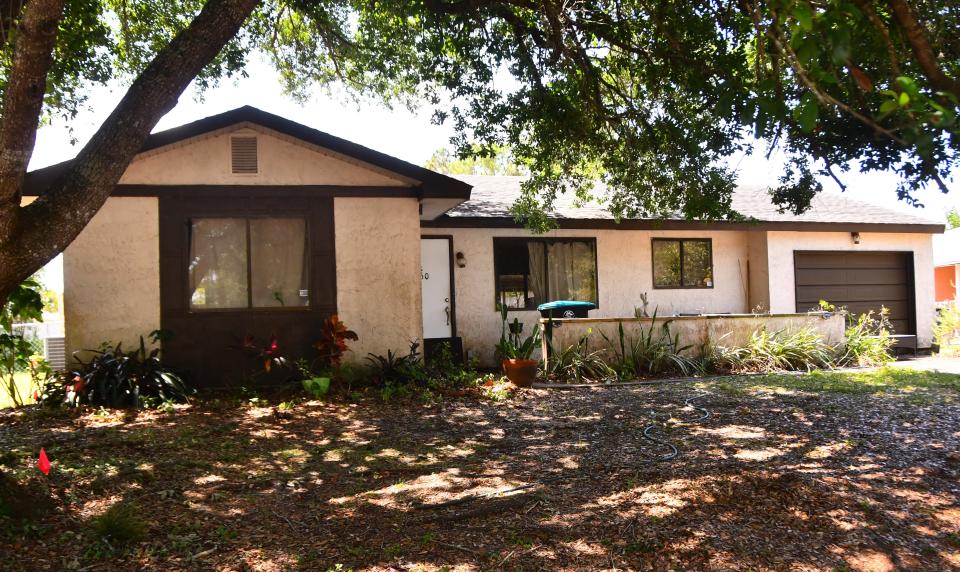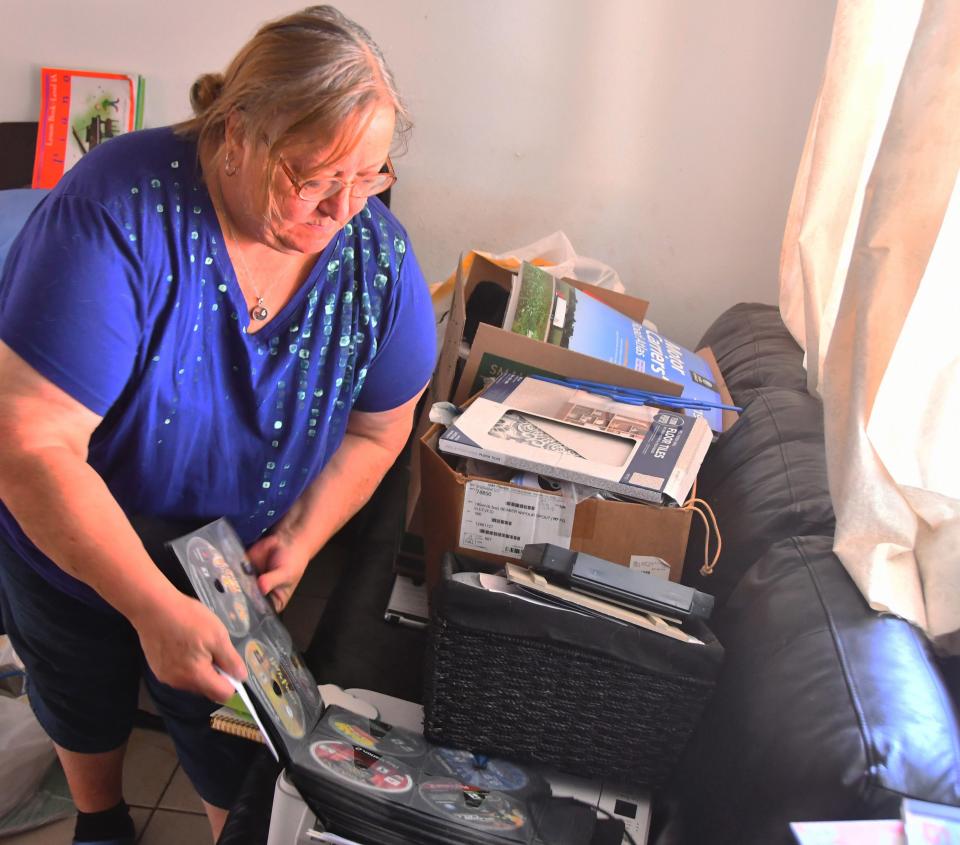Palm Bay woman and son displaced due to lack of affordable housing on Space Coast
Louise Rosevelt, 63, lives a mile away from her sister's place where she and her son, Brandon, eat dinner every Sunday night. She lives 10 miles away from Brandon's treatment center for autism, and just four miles away from Brandon's high school where he's an honors student in the engineering program.
“My son has his whole entire village here,” Rosevelt said.
But it’s a village Rosevelt and Brandon have to leave.
Two weeks ago, Rosevelt received a notice to vacate the property. Rosevelt and Brandon need to be out of their home for most of a decade by May 30.
Subscribers: Titusville clears hurdles to transform the Searstown mall into an 'urban village'
By the way: Brevard Justice Ministry still wants county's help on housing crisis

Roosevelt has been renting her home in Palm Bay for $775 for the past seven years; a price that's near impossible to find in Brevard County’s current rental market. It's a price point at which Rosevelt's landlord can no longer afford to rent.
Crushed by rising home insurance costs in Florida, mom and pop landlords are realizing that it's more profitable to sell their properties than continue to rent them. Out-of-state investors are increasingly buying up these homes by the dozen, sometimes in full cash deals. And tenants like Rosevelt, who have a fixed income, are left with few options in a state that lacks affordable housing and tenant protections.
Investors, insurance and lawsuits

Rosevelt's landlord is Steve Alban, 60. Alban's originally from Connecticut and moved to Palm Bay in 2005.
Alban first started purchasing and renting out homes in the 1980s. Homes were cheap, insurance rates low and tax rates reasonable, he said. He amassed five properties in Florida and started renting them out.
“It was a way to basically live for free,” Alban said, and make a profit.
Before he sold his homes, Alban was considered a high-risk by home insurers
“The only reason I’m considered high risk is if we ever had a Cat 5 (hurricane) I would have been on the end of a very large check,” Albans said.
Citizens Property Insurance was the only company that accepted Alban.
Citizens Property Insurance is the state's insurer of last resort, created in 2002 by the Florida Legislature. It operates as a nonprofit organization.
Lawmakers created Citizens Property Insurance because they realized that in Florida some home owners, like Alban, would be too risky for private companies to insure but, these owners still needed someone to insure them, said Michael Peltier, Citizens spokesperson. It’s rates are typically cheaper than the private market and its capped at how much it can raise insurance rates.
It’s the insurance of last resort. Citizens Property Insurances goal is not to gain new clients, said Peltier. Peltier explained that when the insurance market is healthy, clients leave Citizens because there are private insurers that will take them on. Lately, Peltier said Citizens has been getting about 6,000 new policy holders a week. A sign of an unhealthy market.
According to Peltier, insurance rates have increased in Florida for three primary reasons: homeowners insurance litigations, building material costs and home prices have all increased.
It's a perfect storm of market realities impacting Alban and other landlords just like him.
The amount of home owner lawsuits rose to 153,000 in 2018; in 2013 there were 79,000; in 2000 there were 1,300, according to a 2019 report by the Insurance Information Institute.
Under Florida law, if an insurance company loses the lawsuit, not only do they have to pay for the price set by the judge, they also have to pay for court fees, said Peltier. To compensate for the financial loss, insurance companies raise rates, and insurers end up carrying the financial burden of the lawsuits.
At the same time, the cost to rebuild a home has increased dramatically because materials are more expensive, meaning insurance company payouts are higher when disaster strikes. As a result, insurance rates have gone up to cover the steeper cost of repairs, said Peltier.
According to Florida International University's Dr. Edward Murray, an expert on housing market issues, adding to these pressures is the trend of investment companies sometimes buying up entire neighborhoods, driving up housing prices.
Home purchases by big investors has skyrocketed in Florida, Murray said.
According to data from Redfin, a national real estate brokerage, about 26% of homes in Orlando are now investor owned. While Redfin does not provide an analysis of Brevard County investor-owned properties, FLORIDA TODAY did an analysis of real estate properties in Brevard County using the same method as Redfin and found that at least 20% of Space Coast properties as of 2022 were investor owned; up from 14% in 2013.
It’s a trend that dates back to the early 2000’s, said Murray.
After the tech bubble burst in 2000, investors pulled their money out of technology and moved it into real estate. The trend continued after the housing bubble burst. Investors started aggressively purchasing homes that had lost their value. When the pandemic hit, investors stepped up their buying spree.
“These investors just see a real opportunity to buy these properties and just sit on them,” Murray said.
In April, when Albans' insurance rates increased, he went to what he thought was a property management company. The company, which Alban would not name, told him that they could fix his properties and bring his homes under their insurance plan, saving him money. It turned out to be a scam, Alban said.
But during that effort Alban learned how much his homes were worth. Alban suddenly realized he could make more than four times his original investment. And he could sell the home as is. No fix up needed. Alban put his homes, including the one rented by Rosevelt, up for sale. Within three days he had an offer.
Before Alban decided to sell his homes he offered them first to his tenants. Rosevelt declined his offer. She said she declined because she would have had to sink at least $50,000 into sceptic tank and roof repairs.

Good tenants vs. good profits
Mom and pop landlords like Alban tend to value tenants like Rosevelt who pay their rent on time and maintain their living space, so they’re more willing to rent units out at less than market value, said Fairweather. On the other hand, investment companies tend to value profits, so as more investors buy up properties, rents tend to increase, Fairweather said.
"I was never one to gouge people...Most tenants don't leave me. They stay with me forever." said Murray. "I wasn't out to get rich to do this. I mean, I've been doing this since 1980, running properties. It's what I did, it's what I do. I mean even though she's (Rosevelt) displaced, I'm technically out of a job too now. I mean that's what I did all my life. That's my life's work. And now, I just sold it to the highest bidder."
Murray said while there are many reasons why rental prices have increased, the biggest reason is the rampant investor purchasing of real estate in Florida. The other reason he said is that there just haven’t been enough rental units available.
“If there’s nothing out there then obviously landlords and particularly those who can take advantage of this situation are basically asking for anything they want,” Murray said.
And in Florida, there’s nothing stopping landlords from doing this. Based on Florida Statue 166.043, imposing rent control on private companies is prohibited.
Murray said that if Florida lawmakers pass rent control legislation it might “stabilize the market.” However Murray added that, “unfortunately, a lot of the damage has already been done.”
To help with the problem, some cities and counties in Florida, like Cocoa, are looking at 60-day rent notice increase ordinances. Giving a 60-day notice may give renters more time to plan for other housing accommodations. But, Murray said, "It's a band-aid solution."
“Its not that the investors are the cause of the problem. They are profiting off of the problem,” said Fairweather. “The real problem is the lack of supply.”
No where to go but elsewhere

“I haven’t been sitting on my hinny,” Rosevelt said.
Over the past few weeks, Rosevelts looked everywhere and reached out to everyone she could think of, she said. The moment she found out she would have to vacate she started her apartment search.
What she found were two bedroom apartments priced over $1500-2000. Rosevelt has a fixed income of about $34,000. Many apartments require applicants to make 3x their rent. For Rosevelt, that would mean she needed a two bedroom apartment for $900.
She figured she'd get her sister to co-sign for her, hoping that the combined income would qualify her for three times the rent and she would spend most of her income on paying rent. But, apartment owners told her that if her sister co-signed for her, her sister would need six times the monthly rent. So if the rent was $1,500 a month, Roosevelts sister would need to make $9,000 to qualify for the apartment.
Rosevelt then looked into getting a voucher to help her cover rent costs but was told the program was closed.
She then reached out to the Brevard Homeless Coalition and didn’t hear back. When she went to a local church for help, they told her there was a studio apartment in a high crime neighborhood for $700. Not nearly enough space for her, Brandon, her two chihuahuas Lulu and Daisy and her chickens.
So Rosevelt started selling the chickens. If she does manage to find a place in Brevard County, it won’t have a backyard like Albans place did. If she has to move out of Florida, she won’t be able to take them with her. Packing and moving prices have gone up too.
Brandon hated the chickens. But everyday he would care for them, pick up their eggs, feed them everyday.
But even with the prospect of shedding chicken chores, the moves been stressful on Brandon. He doesn’t like chaos, Rosevelt said, routines and organization are the environments he thrives in.
Felipa Chavez, associate professor of clinical psychology at the Florida Institute of Technology said moves can be hard for children in general. But, for children on the autism spectrum, it can be even harder, Chavez said.
A disruption in their environment can be unbalancing to children on the spectrum and a loss of a home, can be especially “a really major, major disruption to the life,” Chavez said.
Having a stable home can offset anxiety disorders, and help autistic children grow and prepare them to face a world that’s constantly changing.
So, while she figures out what to do over the summer, Rosevelt will be house sitting a friend’s house over the summer in Brevard County, and Brandon will stay at his biological fathers house in Ocala.
But if she can’t find an affordable place to stay, she’ll have to leave Florida altogether, Rosevelt said.
Alban wrote Rosevelt a letter of recommendation. In his letter he detailed how great of a tenant she was and also wrote, “because of my decision to sell the property, Louis(e) has been displaced.”
Rosevelts said she’s been looking at apartments in Appalachia. In Appalachia she can find a three bedroom apartment to rent for less than $400.
In Appalachia, she’ll be 700 miles away from her sisters, Brandon's best friend, and his healthcare system. In Appalachia, she’ll be 700 miles away from her village.
Amira Sweilem is the data reporter at FLORIDA TODAY. Contact Sweilem at 386-406-5648 or asweilem@floridatoday.com.
Support local journalism. Subscribe today.
This article originally appeared on Florida Today: Space Coast resident displaced by increase in rental costs

